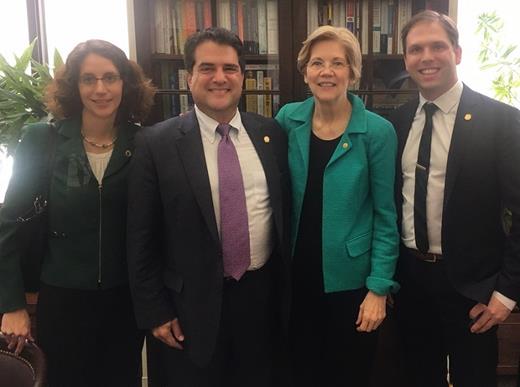Pictured (L-R) Sarah Holstein, MD, PhD; Alan Rosmarin, MD; Sen. Elizabeth Warren (D-MA); Jonathan Hoggatt, PhD
Pictured (L-R) Sarah Holstein, MD, PhD; Alan Rosmarin, MD; Sen. Elizabeth Warren (D-MA); Jonathan Hoggatt, PhD
Every August, members of Congress return home to spend time in their districts, making the end of summer a traditionally quiet time in Washington, DC. ASH, however, remained busy over the summer months working on numerous issues affecting hematologists and arranging meetings for ASH members with their elected officials in their home districts.
ASH’s advocacy efforts are not possible without the help of hematology advocates all over the country. To learn more about how the Society’s members are influencing congressional activity, The Hematologist spoke with ASH member and longtime advocate and researcher, Dr. Jonathan Hoggatt. Dr. Hoggatt has served on the ASH Committee on Government Affairs since 2013 and serves as a liaison to the ASH Committee on Communications. Dr. Hoggatt’s love of advocacy began while in college at Purdue University and eventually led to a stint in public service. He was elected police commissioner and later to the city council in West Lafayette, Indiana. Now, he runs his independent laboratory, a stem cell and regenerative biology research group at Harvard Medical School/Massachusetts General Hospital and continues his passion for public service by advocating on behalf of hematology researchers, practitioners, and patients. “Virtually everything in our day-to-day lives as hematologists is impacted by government decisions,” said Dr. Hoggatt. “Your patients’ ability to afford the care you are providing, or have it properly reimbursed, is government related, and research funding sources are obviously all directly related to budget decisions of elected officials.”
Dr. Hoggatt got his start advocating for hematology in 2011 when he was selected to participate in the inaugural class of the ASH Advocacy Leadership Institute (ALI), a two-day program at ASH Headquarters in Washington, DC, that provides ASH members with the opportunity to learn about the policy-making process and how to be effective hematology advocates. “That year [2011] was an interesting time, as sequestration of the federal budget occurred as a result of the Budget Control Act,” recalled Dr. Hoggatt. “A lot of the hematology community was worried about the effect of budget cuts on their research labs and trainees, and ASH spent a great deal of effort advocating on behalf of NIH [National Institutes of Health] funding.”
Dr. Hoggatt is uniquely positioned to take part in the deliberations of both the Committee on Government Affairs and the Committee on Communications. “I view the functions of these two committees as very much intertwined and have been working with committee members on how we can better communicate issues that are important to our membership,” said Dr. Hoggatt. “Much of advocacy is about having a voice, and every constituent has one. But, lots of voices all coordinated together, with a well-crafted message, have the potential to enact meaningful change. What I try to learn from both committees is how best to achieve that goal.”
The Society is dedicated to supporting its members in advocating for hematology at the local, state, and national levels of government. Dr. Hoggatt encourages his colleagues to participate in ASH’s advocacy work by signing up for the ASH Grassroots Network to receive regular updates and information about how to stay in touch with members of Congress. “Through the Grassroots Network, it is super easy to send an email to your representative on various advocacy issues, and multiple committees of ASH regularly go to Capitol Hill and advocate in person at congressional offices,” he explained.
While joining the Grassroots Network is one of the easiest ways to establish relationships with your elected representatives, there are other ways to make sure your voice is heard. “Go to town hall events if they have them,” encouraged Dr. Hoggatt. ASH staff is ready to assist by preparing interested members with talking points to use at local town hall meetings or in meetings with your congressperson back at home. Social media shouldn’t be discounted either. “Virtually every single congressional member has a Twitter account,” said Dr. Hoggatt. “Twitter and other forms of social media are very effective communication tools.
“Finally, what I have found personally effective is to communicate with [elected officials] both about policies and actions you like and agree with, along with those that you don’t like. Any good relationship we have with anyone else in our lives would never just focus on the negatives, yet often that is the only time a constituent will contact an elected official,” Dr. Hoggatt remarked. “Try to equally communicate both the good and the bad.”
Building a relationship with any congressional office takes time, but the impact that it can have on hematology is invaluable. “I said earlier that every constituent has a voice — that is perhaps the most remarkable thing about our democracy,” said Dr. Hoggatt. “Hematologists, like everyone, should make sure to use it.”
Interested in becoming more involved in ASH’s advocacy efforts? Visit www.hematology.org/Advocacywww.hematology.org/Advocacy for additional information about ASH advocacy and how to join the ASH Grassroots Network, as well as to access ASH’s online advocacy toolkit.

